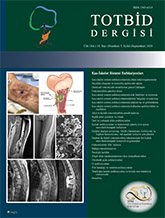
Periprosthetic joint infections (PJI) are classified as earlyacute, delayed-chronic, late-acute and late-chronic hematogenous PJI according to current guidelines. Treatment options in PJI are debridement, antibiotics and implant retention (DAIR), single or two-stage revision arthroplasty. Sal-vage procedures are resection arthroplasty, arthrodesis, and above-knee amputation. In acute PJI, the first recommended surgical method is DAIR. DAIR should be done within the first 3 weeks (especially first 7–10 days) in clinically suspected cases. Evaluation of the patients before DAIR with KLIC and CRIME questionnaire guides the effectiveness of the treatment in the postoperative period. Isolation of the causative microorganism in the preoperative period and determination of antibiotic sensitivity is the most important factor that increases the success rates. In subacute and chronic infections due to the formation of a bacterial biofilm layer, revision arthroplasty op-tions should be considered as a first choice. Although still two-stage revision arthroplasty is the gold standard, single-stage revision arthroplasty is gradually becoming a preferred method. In single-stage revision arthroplasty the criteria for successful results; resistant immune system, lack of systemic sepsis, enough soft tissue that provides primary wound coverage, minimal bone loss, first and for most the detection of the causative microorganism before the operation.